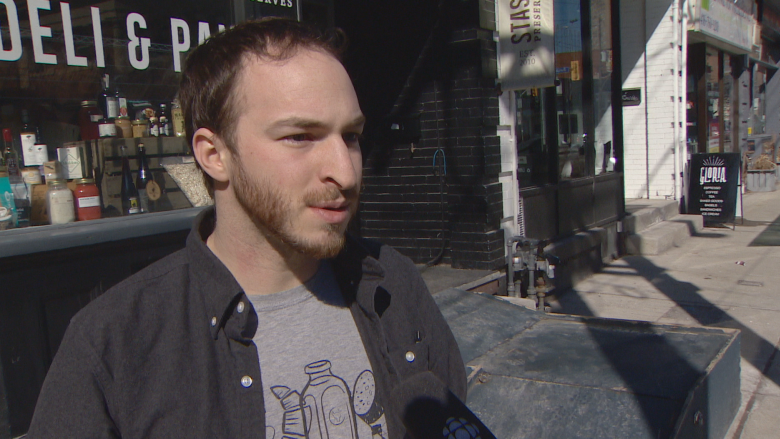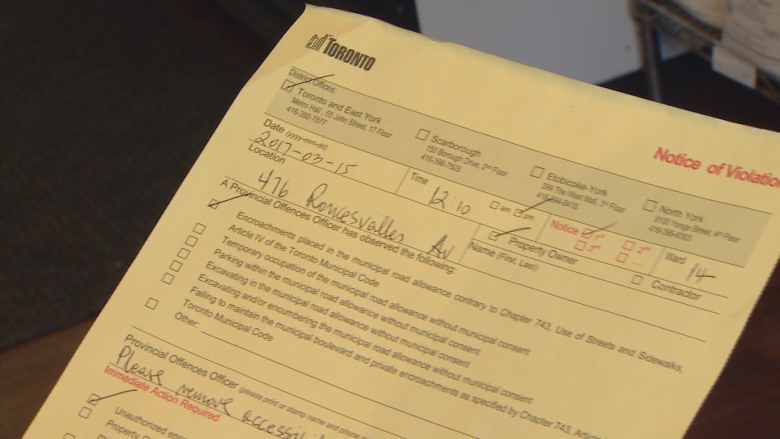Toronto deli owner sounds off after city orders his accessibility ramp removed
A Toronto deli owner is sounding off after being issued a city notice to remove an accessibility ramp that's sat outside his shop for the last three years.
Julian Katz installed the ramp outside his Roncesvalles deli, Stasis Preserves, back in 2013. It's manufactured by StopGap, a charitable foundation developed by Luke Anderson, an engineer and survivor of a life-changing bike accident that rendered him unable to walk.
But despite the ramp being designed by and for a wheelchair user, Katz received a notice on March 15 saying it violated a municipal bylaw and provincial code. The notice said he had five days to get rid of it.
"The irony is that the city is fighting for accessibility on the sidewalks, but by increasing the accessibility on the sidewalks, they're completely negating all of the accessibility to our store."
'If they say 2025, why not 2017?'
Katz points to the province's Accessibility for Ontarians with Disability Act (AODA), which aims to make all government, non-profit and private businesses accessible within the next decade.
"The mandate from the province is that the whole city needs to be accessible. So if they say 2025, why not in 2017?" he said in an interview with CBC Toronto, with three days left to address the notice.
"If the province is pushing for accessibility in all businesses but then the city's fighting, there needs to be some allowances."
The city's manager of pedestrian projects and transportation services says there are several issues with the ramp, about which the city recently received a complaint.
The first of those is that anyone installing a structure on city-owned sidewalks or right of ways needs to have an encroachment permit, Fiona Chapman said.
City cites lack of permit, safety issues
"When we looked at it, we thought, 'Well it's just one of those StopGap [ramps].' But it's a structure; it's not coming in and out. It's staying there permanently," Chapman said.
It also violates code requirements, she said.
The ramp has no handrails, she points out, and has a 90-degree turn without the necessary landing to safely turn a mobility device.
"There are kind of basic standards that this doesn't meet."
For his part, Anderson maintains the multi-level ramp works. But he acknowledges that, as his foundation's name suggests, "It's not perfect."
He also says the name StopGap is an indicator of the situation surrounding accessibility in the city and the province.
"We need to get together with city officials and stakeholders to … talk about how our existing bylaws and existing building codes are really preventing us from reaching a barrier-free Ontario."
In 2014, Anderson himself received an Access, Equity and Human Rights award from the city. And in 2012, city council adopted a motion to look into how it could support the StopGap ramp initiative.
'A constructive solution'
But while several councillors expressed support for Anderson's designs, ultimately no partnership was formalized, Anderson says.
In an email to CBC Toronto, Ward 14 Coun. Gord Perks touted the StopGap program as a success because of the "quick easy fix" it can provide for buildings.
"Most StopGap ramps are simple and straightforward. The city has supported these. However, this location has bigger challenges," Perks said citing the 90-degree turn and lack of handrails. "The whole point of the ramp should be to provide safe access."
Perks added that the city has raised its concerns with StopGap, but they have yet to come to a solution.
"As much as I want access in a hurry, I can't support installing accessibility ramps that are dangerous and don't really solve the access problem," Perks said.
Chapman says she's reached out to Katz and is looking forward to a conversation about the next steps.
"Generally speaking, when we give these notices of violation, in part, it sort of [says] 'Pick up the phone, please call us,'" she said. "And we're often able, at that point in time, to put a hold on that hard date and say, we're talking, we're trying to work towards a solution."
Katz says he's willing to do whatever he can to keep the ramp outside his deli.
"But to just be told that it has to be removed completely is not a constructive situation."




